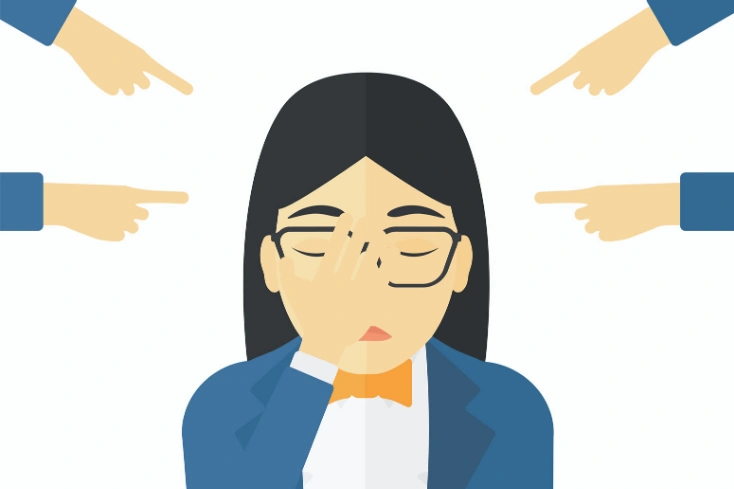The Stigma of Mental Health in Asian American Culture: Why is it Such a Taboo?
In America, Asian Americans are the least likely racial group to report and receive mental health care. From cultural norms to the “model minority myth”, there are many reasons as to why mental health is so highly stigmatized in Asian communities.
Asian Americans account for roughly 5.7% of the U.S. population, equivalent to about 18.9 million individuals, according to the 2019 Census Bureau population estimate.
Mental illnesses affect people across all different ethnicities, cultures, and nationalities. The National Latino and Asian American Study reported that, “while 18% of the general U.S. population sought mental health services and resources, only 8.6% of Asian Americans did so.” Moreover, studies from the Mental Health America (MHA) stated that Asian Americans are the least likely racial group in the U.S. to seek mental health help; white U.S. citizens take advantage of mental health services at three times the rate of Asian Americans.
The stigma around mental health and illnesses in Asian communities stems from a variety of issues: fear of disability, cultural norms and values, needing to “save face”, the “model minority myth”, gender norms, and language barriers.
A 2010 survey from the American Public Health Association (APHA), revealed that the correlation between disability and mental illness was one of the most significant obstacles in Asian Americans accessing mental health care. In Asian culture, having a mental illness often means a person is not “strong” enough, nor able to function "normally." As a result, people will abstain from revealing their symptoms and accessing healthcare.
This idea of needing to be “strong” also ties into the cultural norms and values that can exacerbate mental health issues and decrease the chances of mental health support. Many Asian American families, especially more traditional ones, put great emphasis on strong family values and obligations. Ancient Asian philosophers also highlighted a person’s self-value with their ability to care for their family and community. The great Chinese philosopher Confucius, for example, emphasized the need for filial piety— a social and family hierarchy with the elder placed at the top. This notion could result in people equating mental illness with failure—failure to live up to family expectations and obligations.
In Asian culture, there is a popular saying of needing to “save face” in front of family, friends, and in public. In order to “save face”, many people will avoid discussing issues such as mental health to avoid feelings of humiliation, shame, or disgrace. This concept is a core social value in Asian cultures, and this term is often taught between parents and children as a strategy to always maintain dignity and preserve a strong reputation. Furthermore, the perpetual “model minority myth” can both exacerbate mental illnesses and fuel the stigma of speaking out about mental health—since “model minorities” are able to excel in life and easily overcome challenges. The high, and at times unrealistic, expectations of Asian parents and society put on children can also lead to low self-esteem and mental health issues.

Additionally, the gender norms Asian men and women face serve as another factor in preventing Asians from reaching out to mental health professionals. A study by the National Asian Women’s Health Organization found that many restrictive attitudes and beliefs impacted Asian American women’s choice to access mental healthcare. As a mother or wife, women may feel more responsible for always being "on top of their game," and consequently meet unrealistic family and societal standards. As a result, women could fear appearing “weak” discussing mental health issues, and do all they can to avoid feeling like a failure in caretaking. Lastly, the study found that women who witnessed mental illnesses in family members were encouraged to stay silent, which could further stigmatize the issue of mental health in Asian communities.
Similar gender-related issues are seen with Asian American men. Traditional masculine gender roles, such as being the “head” of the family, can cause Asian men to feel intense shame or guilt for not living up to that role as the “protector." These feelings can result in the fear of talking openly about mental health. Aside from the race factor, the idea that men in general should not express emotions also contributes to the stigma of mental illnesses.
Lastly, language barriers, especially for the older Asian generation, can be an obstacle to accessing proper mental health care. Since many therapists and mental health professionals primarily operate in English, it creates a barrier for them to understand and empathize with the struggles Asian patients experience.
Mental health needs to be de-stigmatized in Asian American communities, as there is a strong correlation between Asian values of high expectations and mental health issues.
There are a variety of mental health resources for Asian American and Pacific Islander communities. Here are a few:
Asian American Psychological Association- https://aapaonline.org/
Asian American Health Initiative- https://aahiinfo.org/
National Asian Pacific Islander Mental Health Association- https://www.naapimha.org/
React to this Post
- 2
- 2
- 0
- 0
- 0
- 0
- 0
